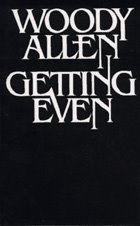
Getting Even. Woody Allen
Getting Even is one of three early collections of Woody Allen's short humorous articles. The others are Without Feathers and Side Effects. Many of the pieces in Getting Even appeared in magazines, mostly The New Yorker, but also Playboy and Evergreen Review. While others first appeared in this anthology. In total, there are 17 articles in the collection. As that they were written over 35 years ago, there are some references that do not come across well today. Yet as a group they are still quite funny.
"The Metterling Lists" is a piece of satirical literary criticism of The Collected Laundry Lists of Hans Metterling Vol. 1, a supposedly scholarly work of 437 pages that analyzes the first six laundry lists. Fortunately Mr. Allen only takes seven pages to mock this fictional piece of scholarship.
"A Look At Organized Crime" provides a very brief history of organized crime in America including the murder of Kid Lipsky by Albert (The Logical Positivist) Corillo who locked Lipsky in a closet and "sucked all the air out through a straw." It also provides a description of a Mafia initiation ceremony and ends with some tips on fighting mobsters.
"The Schmeed Memoirs" are represented as the recollections of Hitler's barber. Yet they can't be taken too seriously because he claims he didn't know Hitler was a Nazi, and thought he worked for the phone company. There is a funny section where Hitler fears that Churchill will grow sideburns before he can. It is humorous to view World War II from the perspective of Hitler's hair.
"My Philosophy" consists of the Critique of Pure Dread, the Eschatological Dialectics As a Means of Coping with Shingles, and The Cosmos on Five Dollars a Day. It ends with two Parables and a short list of Aphorisms.
"Yes, But Can The Steam Engine Do This?" provides a humorous take on the scientific research saga with a history of the Earl of Sandwich's research into developing the sandwich. Starting with his birth in 1718, the tale is filled with bread experiments, research into cold cuts and cheeses, and years of failures followed by his final success and lasting fame.
"Death Knocks" is a short play in which an inexperienced Angel of Death, who comes to claim Nat Ackerman's soul, is lured into a losing game of gin rummy and returns empty-handed.
"Spring Bulletin" is Woody Allen's satirical take on college course descriptions. It includes a course called Introduction to God which is described as "Confrontation with the Creator of the universe through informal lectures and field trips."
The next piece, a guide to the interpretation of Hassidic tales, includes tales like the following and Mr. Allen's interpretations of them.
A man journeyed to Chelm to seek the advice of Rabbi Ben Kaddish.
"Rabbi " the man asked, "where can I find peace?"
The Hassid surveyed him and said, "Quick, look behind you!"
The man turned around, and Rabbi Ben Kaddish smashed him in the back of the head with a candlestick. "Is that peaceful enough for you?" he chuckled.
There are six other tales and their interpretations in this piece.
"The Gossage-Varbedian Papers" tells the sad story of a chess game played at a distance via letters. The correspondence starts out with a missive from Gossage stating that one of his letters must have gotten lost in the mail since his chess board is set up differently than Verbedian's. The insults and the confusion worsen as the letters go back and forth. A must for any chess fan.
"Notes From The Overfed," Mr. Allen claims, was inspired by reading Dostoyevski and a Weight Watchers magazine on an airplane trip. In it an Atheist is converted when he decides that, if God is everywhere, He must be in food. Then consuming everything in sight, he achieves sanctity and obesity through compulsive eating.
"A Twenties Memory" mocks the name-dropping memoirs of the post-war lost generation. Filled with references to Gertrude Stein, Picasso, Earnest Hemingway, Alice B. Toklas, and many others, a non-entity tries to gain fame by the shared light of his famous contemporaries.
In "Count Dracula" the famous vampire wakes up early due to confusion caused by a solar eclipse, and visits the baker and his wife for what he thinks is an evening snack with disastrous consequences.
In "A Little Louder, Please" a true afficionato of the arts confesses his one failing - an inability to understand the gestures of mimes.
"Conversations With Helmholtz" consists of notes taken by the student of a famous elderly psychoanalyst of their conversations together. Senility has certainly gotten the better of the older man, but his reputation and fame keep the younger man from realizing this with humorous results.
"Viva Vargas" is subtitled "Excepts From The Diary of A Revolutionary," and reveals much of the same humor that the author later used in the movie Bananas.
"The Discovery And Use of The Fake Ink Blot" provides a humorous social history of a device used in practical jokes.
The last story in the volume, "Mr. Big", is my favorite. It is narrated by a Philip Marlowesque detective who is hired by a lovely woman claiming to be a Vassar student. She wants him to find a missing person, God. The mixture of Raymond Chandler's format with the existential search for the meaning of life is extremely funny even after the passage of many years.
All in all, if you like the early Woody Allen movies, you will love this book - even though some of the material is no longer as fresh.
No comments:
Post a Comment